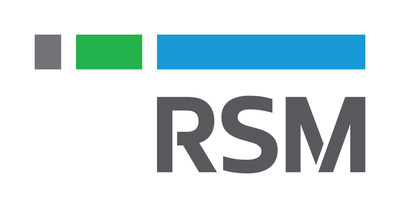RSM US Middle Market Business Index Dips as Firms Face Intensifying Margin Pressures
Survey shows middle market sentiment remains subdued amid rising prices and policy uncertainty
CHICAGO, Sept. 23, 2025 /PRNewswire/ -- The RSM US Middle Market Business Index (MMBI), presented by RSM US LLP ("RSM") in partnership with the U.S. Chamber of Commerce, declined modestly to 122.5 in the third quarter from 124.2 in the prior period on a seasonally adjusted basis. The survey results reflect a slightly more pessimistic view among middle market firms as economic and policy uncertainty continue to weigh on business prospects.
Despite expectations of relief as pro-growth expansionary fiscal policy takes effect in 2026, middle market sentiment remains tempered amid ongoing pricing pressures, continued inflation and tightening margins. In the third quarter, only 37% of executives reported economic improvement, 39% noted revenue growth, and 43% saw higher earnings. Looking ahead, however, half (50%) of business leaders expect the economy to improve over the next six months, with 58% anticipating revenue gains and 60% projecting stronger earnings as tax cuts approach.
"Margin compression is the defining theme of this quarter's survey results," said Joe Brusuelas, chief economist with RSM US LLP. "Input costs are rising faster than prices received, and profitability will stay under pressure until companies can pass more of these costs on to customers. We expect thinning profit margins to drive the economic narrative for middle market firms until certainty on trade and policy is restored."
Rising Input Costs Squeeze Margins as Tariffs Complicate Inventory Management
The data underlying the topline index strongly suggests middle market firms are facing narrowing profit margins as they struggle to pass along price increases. In the third quarter, 67% of survey participants reported an increase in prices paid for goods and services, yet only 48% indicated an increase in prices received – down from 56% in the prior period. When asked about the months ahead, 67% of executives indicated they anticipate paying higher prices and 62% expect to raise prices.
With the public tariff schedule signaling sharp price increases ahead for raw and intermediate goods, inventory management is another key concern heading into the holiday season. Unsurprisingly, inventory accumulation slowed after firms pulled forward goods orders ahead of tariffs going into effect earlier this year. Only 35% of respondents said they increased stocks on hand in the current quarter, while 44% indicated they intend to do so over the next six months.
"It is clear that the benefits from the recent enactment of the tax bill – greater certainty and reduction in the after-tax costs of capital investments – are being eroded by tariffs and greater than usual policy and economic uncertainty," said Neil Bradley, executive vice president and chief policy officer at the U.S. Chamber of Commerce. "For our economy to reach its full potential, it is critical that we reduce the tariff burden, continue to reduce regulatory and permitting costs, and address persistent labor constraints."
Slowing Labor Spending and Reduced Capital Expenditures Reflect Cautious Sentiment
Further underscoring executives' cautious sentiment, the MMBI survey also showed a slowdown in both hiring and capital expenditures. Thirty-four percent of executives said they increased hiring in the current quarter and 43% raised compensation to attract labor currently. Looking ahead, 46% expect to increase hiring and 54% anticipate increasing wages in the near term.
Capital expenditures in the current quarter among middle market firms also appeared to have slowed, with 38% of firms increasing outlays on productivity enhancing software, equipment and intellectual property this quarter and 50% planning to boost investment in the coming months.
The survey data that informs this index reading was gathered from 404 respondents at middle market firms in the United States from July 14 to Aug. 4, 2025.
About the RSM US Middle Market Business Index
RSM US LLP and the U.S. Chamber of Commerce have partnered to present the RSM US Middle Market Business Index (MMBI). It is based on research of middle market firms conducted by Harris Poll, which began in the first quarter of 2015. The survey is conducted four times a year, in the first month of each quarter: January, April, July and October. The survey panel consists of approximately 1,600 middle market executives and is designed to accurately reflect conditions in the middle market.
Built in collaboration with Moody's Analytics, the MMBI is borne out of the subset of questions in the survey that asks respondents to report the change in a variety of indicators. Respondents are asked a total of 20 questions patterned after those in other qualitative business surveys, such as those from the Institute of Supply Management and National Federation of Independent Businesses.
The 20 questions relate to changes in various measures of their business, such as revenues, profits, capital expenditures, hiring, employee compensation, prices paid, prices received and inventories. There are also questions that pertain to the economy and outlook, as well as to credit availability and borrowing. For 10 of the questions, respondents are asked to report the change from the previous quarter; for the other 10 they are asked to state the likely direction of these same indicators six months ahead.
The responses to each question are reported as diffusion indexes. The MMBI is a composite index computed as an equal weighted sum of the diffusion indexes for 10 survey questions plus 100 to keep the MMBI from becoming negative. A reading above 100 for the MMBI indicates that the middle market is generally expanding; below 100 indicates that it is generally contracting. The distance from 100 is indicative of the strength of the expansion or contraction.
About The U.S. Chamber of Commerce
The U.S. Chamber of Commerce is the world's largest business organization representing companies of all sizes across every sector of the economy. Members range from the small businesses and local chambers of commerce that line the Main Streets of America to leading industry associations and large corporations.
They all share one thing: They count on the U.S. Chamber to be their voice in Washington, across the country, and around the world. For more than 100 years, we have advocated for pro-business policies that help businesses create jobs and grow our economy.
About RSM US LLP
RSM empowers middle market companies worldwide to take charge of change. The clients we serve are the engine of global commerce and economic growth. Our unique middle market perspective makes RSM the natural choice for growth-oriented, internationally active organizations seeking relevant insights and tailored, innovative solutions for a complex and changing world. With a global reach spanning more than 120 countries, we instill confidence in a world of change by bringing the full power of RSM to make a lasting impact on our clients, colleagues and communities. For more information, visit rsmus.com, like us on Facebook and/or connect with us on LinkedIn.
![]() View original content to download multimedia:https://www.prnewswire.com/news-releases/rsm-us-middle-market-business-index-dips-as-firms-face-intensifying-margin-pressures-302564518.html
View original content to download multimedia:https://www.prnewswire.com/news-releases/rsm-us-middle-market-business-index-dips-as-firms-face-intensifying-margin-pressures-302564518.html
SOURCE RSM US LLP


